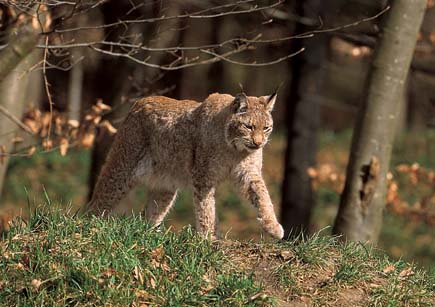
EuroNatur: Fragmentation of landscapes? New studies demonstrate alternatives
Press Release from October 1, 2010
Radolfzell. In cooperation with international experts for wildlife protection, the nature heritage foundation EuroNatur demonstrates in a current study how the negative impacts on wildlife and their habitat through the fragmentation of landscapes can be avoided. Today, this study will be presented on occasion of an international conference in Hungary.
"Together with our partners, we have successfully summarized the knowledge gathered over the years from projects in Poland, Croatia and Slovakia and compiled a coherent and realistic work of reference. This manual not only address to nature conservationists, but also to road planners and builders", says EuroNatur project leader Annette Spangenberg.
In view of the rapid expansion of road and transport networks, especially in Central and Southeast Europe, the subject of landscape fragmentation is ever more urgent. Wolves, bears, lynxes and their prey continuously run the risk of being run over while crossing roads and railway lines, and many obstacles are impassable altogether. As a result, wildlife populations are split into small fragments, incapable of surviving in the long run.
"The best would be to already plan roads and railway lines in such a way that they give wildlife corridors a wide berth", demands EuroNatur director Gabriel Schwaderer. "If this is not feasible, the impact on the animals should be kept at a minimum by creating wildlife crossings".
This manual is no kind of an inflated theoretical essay; instead, it helps finding, implementing and controlling the effectiveness of measures against the fragmentation of landscapes.
Actual case studies from Croatia, Slovakia, Poland and Bulgaria provide a realistic support and genuine action plans.
Background:
The manual has been developed within the scope of the project "Trans-European Wildlife Networks", promoted by the Deutsche Bundesstiftung Umwelt DBU, one of Europe's largest foundations promoting innovative and exemplary environmental projects. The project aims at counteracting the fragmentation of landscapes on the Balkan Peninsula, in order to preserve the habitat for large predators such as wolves, bears, lynxes and their prey. In this context, helpful experience from projects in Poland, Croatia and Slovakia was transmitted to Bulgaria and Romania, in order to improve the status of nature conservation in these two countries.
Another target of the project, to which the manual contributes essentially, was to set up an international network of experts in landscape fragmentation.
Project partner „Trans-European Wildlife Networks“and authors of the manual:
EuroNatur (D), Zoologische Gesellschaft Frankfurt (D), Institut für Landespflege der Albert-Ludwigs-Universität (D), Association for Bird and Nature, Association for Bird and Nature Protection “Milvus” (RO), Association for Nature “Wolf” (PL), Balkani Wildlife Society (BG), Biology Department, Veterinary Faculty, University of Zagreb (HR), Carpathian Wildlife Society (SK), Mammal Research Institute, Polish Academy of Science (PL)
The printed manual: „Trans-European Wildlife Networks Project – TEWN. TEWN Manual – Recommendations for the reduction of habitat fragmentation caused by transport infrastructure development” (ISBN-Nr: 978-3-00-032533-5) is available at our office.
Please address orders to:
EuroNatur
Konstanzer Str. 22
78315 Radolfzell
Germany
Phone +49 (0) 7732-9272-0
Fax +49 (0) 7732-927222
E-Mail: info@euronatur.org


